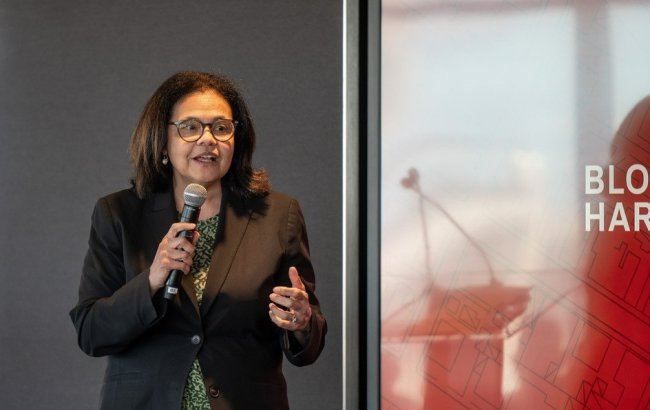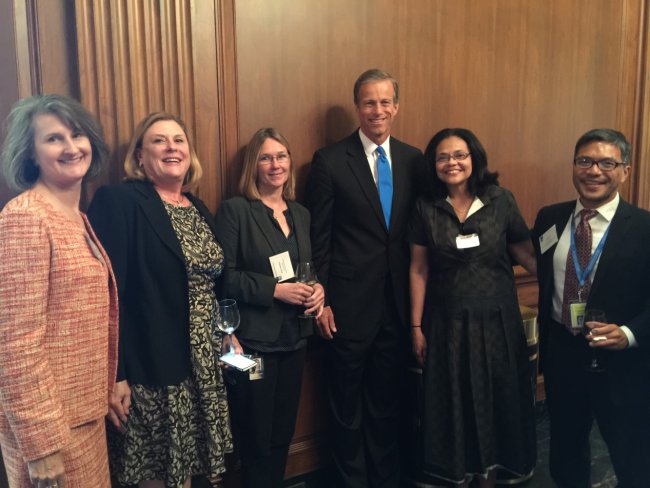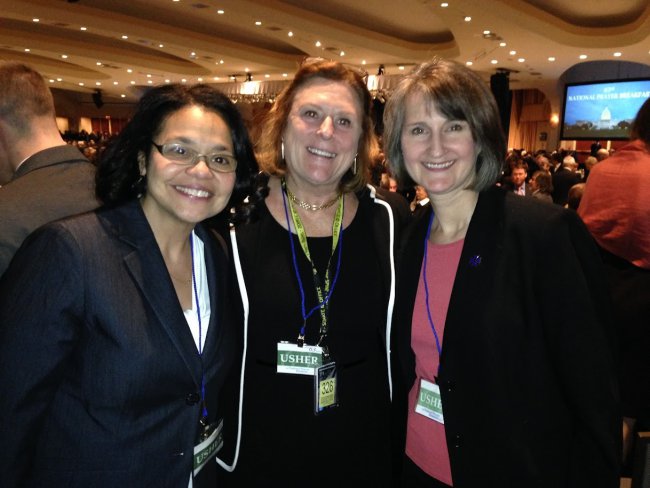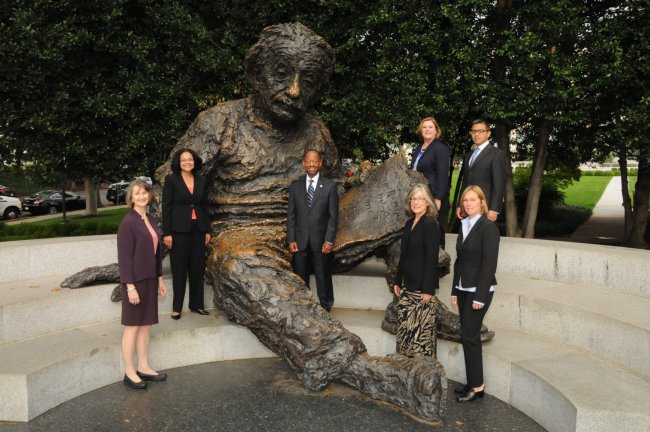From Clinical Psychology to Public Policy: How Dr. Kimberlyn Leary Took Clinical Experience to the White House with the RWJF Health Policy Fellows

Kimberlyn Leary, 2014-2015 RWJF Health Policy Fellow. Photo courtesy Kimberlyn Leary
For nearly 50 years, the Robert Wood Johnson Foundation Health Policy Fellows Program has sought to build a strong, diverse network of leaders and maintain a workforce skilled in health policy. By connecting health professionals with the first-hand opportunity to participate in the federal policy process, this nonpartisan program aims to improve health equity, care, and policy. To learn more about the fellowship experience, we hear from Dr. Kimberlyn Leary, a fellow from the class of 2014–2015. In the interview below, Leary, Senior Vice President at the Urban Institute and Associate Professor at Harvard Medical School and the Harvard T.H. Chan School of Public Health, discusses her time at the White House, changes in perceptions around mental health care, and the importance of understanding the public policy process in order to effect change.
After building a successful career in clinical psychology, Leary developed an interest in how public policy could affect her organization’s ability to offer publicly funded services. This curiosity eventually led her to pursue a master’s in public administration and then the Robert Wood Johnson Foundation (RWJF) Health Policy Fellows Program, where she landed a placement at the White House during the Obama administration. Read on to find out about Leary’s experience in the program, how her broad knowledge base helped her launch a key equity initiative from the White House, and her advice for prospective fellows.
Can you tell us about yourself and your work before the fellowship?
I’m trained as a clinical psychologist and, several years ago, I went back to school to do a mid-career master’s in public administration at the Harvard Kennedy School. At the time, I had been working in public sector mental health as a chief psychologist at one of the Harvard hospitals. I became so aware that everything we did—whether we could expand services or contract them—was all connected to public funding, and that public funding was connected to public policy decisions. So, I went to the Kennedy School to learn about public policy.

Members of the 2014-2015 class of RWJF Fellows with Senator John Thune.
How did you hear about the RWJF Health Policy Fellows Program and what made you decide to apply?
I heard about the fellowship from Hassan Tetteh, whom I knew through a Harvard connection. He had gone through the fellowship and had been at the Congressional Budget Office for his placement. What he told me about the program sounded really amazing.
I’m not sure I’ve ever worked harder on any application than the one I did for the RWJF Health Policy Fellows program. I wrote about my father who had recently passed away, and his experience in health care: He’d had a heart attack while on a flight, so the plane had to be rerouted to the closest city, which happened to be a small city in the south. It was very different than the health care he could have gotten in Boston. That became a way of thinking about not only my own personal story, but also the discussion about health care that was taking place so urgently and ardently in Washington, D.C., at that time.
“I wanted to learn how to deliver change at the national level and that’s where my career pivoted after the fellowship. Everything I am doing and have done since the fellowship has been focused on cross-boundary collaboration, innovation at scale, and delivering equity at scale.”
What changes have you seen in how mental health care is understood and perceived at the start of your career as compared to now?
At the start of my career, mental health care was still very, very stigmatized—especially in communities of color. Back then, mental health care meant care for severe psychiatric illness, severe substance use, or alcoholism. These were things that people didn’t want their employers or their family to know about, especially with the distrust that has existed in communities of color about health care more broadly. Also, mental health care can seem a little strange to people: You know, how does talking about something make it better?
Happily, what’s changed over the course of my career is that mental health care is now understood— particularly after the pandemic—as something that pertains to all of us. In addition, as we’ve looked at what it means to have a culture of health and health equity, mental health has become much more prominent. It’s entered the realm of social justice.
What changes do you really want to see at the policy level to address the barriers to health equity you mentioned?
One of the important dimensions that probably doesn’t get enough play in the popular conversation is that mental health parity is not yet comprehensive. Insurance companies and payers engage in practices that make it difficult for people to get the care that they need. Too often, the clinicians who are doing mental health work are not reimbursed at a rate that they would be if they were providing physical care. All those factors have an impact on the availability of providers, so we need to look structurally at parity and make parity real.
We also need to rethink state-based licensure in the age of the internet. There is no reason why a place like Boston or New York that has a density of psychotherapists couldn’t make their services available to other communities across the country, especially with children’s services. There is a large unmet need when it comes to children’s mental health care because there are so few child psychiatrists and psychologists.
At the start of the pandemic, we had all these inhibitions about using tele-mental health and changing some of our rules and regulations. Then, when it was necessary to make that change or people couldn’t practice, lo and behold, they became great innovators. When people are interested in innovation, they can innovate.

Kimberlyn Leary with two other 2014-2015 Fellows, Colleen Leners and Marian Grant.
Can you tell us about peers and mentors who have helped you on this path?
In terms of mentors, I had a very supportive department chair who could look around the corner and see the value there.
The fellowship network has also been a critical resource for me over the years. My fellowship group was collegial and collaborative, and we’re very close. I just had dinner with two members of my RWJF group, and I see them and others with some regularity. Our fellowship group had two nurses, one pediatric anesthesiologist, a surgeon, a psychologist (me), and we had a radiologist. The professional diversity was really important, and two members were African American.
What goals were you hoping to achieve through the fellows program?
I wanted to learn how to deliver change at the national level and that’s where my career pivoted after the fellowship. Everything I am doing and have done since the fellowship has been focused on cross-boundary collaboration, innovation at scale, and delivering equity at scale.
“…when the political moment is ripe for change, you can’t be scrambling to figure out what you’re going to do. I started to understand the whole notion of a policy window, the policy process, and the policy ecosystem.”
Can you tell us about your fellowship placement, your projects, and your work starting the Advancing Equity initiative?
Marie Michnich, the head of the fellowship program when I was there, told us: “I want your placement to be a hard choice. Don’t just go with what you know. Don’t have a closed mind about where you want to go. Open your mind and really imagine yourself in different places.” I took that to heart. In the past, I had served on an assignment at the Office of National Drug Control Policy (ONDCP), and I knew that they would be willing to have me for the RWJF Fellows Program placement. However, I hadn’t really considered the Senate or the House of Representatives. So, I threw myself into the process and I was lucky to have such an array of choices. Senator Elizabeth Warren offered me a spot, the Senate Health Committee offered me a spot, the Senate Finance Committee offered me a spot, and ONDCP offered me a spot.
At the same time, I met with Valerie Jarrett who was then President Obama’s right-hand person. She told me they had been talking about starting new work focused on women and girls of color and asked if I’d be interested in helping with that.
It was a really hard choice, deciding between the different placements I was offered. However, in the end, I couldn’t turn down the opportunity to serve the first Black President of the United States and to work on issues of girls and women, so I said yes to that work: the Advancing Equity initiative.
There, I worked across sectors to help develop the initiative from the ground up focused on topics like girls in the juvenile justice system and foster care system; school discipline issues, because girls of color are subject to disproportionate rates of expulsion and suspension from public schools; and girls and young women in the STEM pipeline in terms of economic development and economic prosperity.
We partnered with Wake Forest University, which was the lead organization bringing together about 50 academic programs. With the next administration, when lots of work that had been done disappeared, this particular work continued since the programs were anchored in academia and not in government.
It sounds like all of those experiences gave you a set of new skills that you might not have had in your previous role. How did you translate those skills into your career and work now?
I learned to recognize that policy development precedes policy implementation. That sounds like an obvious thing, but you really need to have a set of policy levers and interventions based on research and evidence that are always working on behalf of whatever issue area is of concern to you. I learned that when the moment arrives, when the political moment is ripe for change, you can’t be scrambling to figure out what you’re going to do. I started to understand the whole notion of a policy window, the policy process, and the policy ecosystem.

The 2014-2015 class of RWJF Fellows.
Could you reflect on a learning experience during your fellowship experience?
I just finished up a stint in the Biden White House working for Susan Rice, who is at the center of the Biden administration’s push for innovation in mental health care. Quite frankly, I would not have had the opportunity to work in the Biden administration, helping to implement the president’s executive order on equity, if I hadn’t had that learning opportunity in the Obama administration during my fellowship.
What is your advice to prospective applicants?
When I participated in the program, I really did detach from my work. I wasn’t doing psychology work on the side. I’m so glad that I was able to give myself over to the fellowship for that year, so my advice is to do that.
Learn more about RWJF Health Policy Fellows by following us on LinkedIn! For more information about the upcoming fellowship application, visit our website. We appreciate your support in building a strong and diverse network leaders and maintaining a workforce skilled in health policy. Email info@healthpolicyfellows.org for questions about program opportunities.
